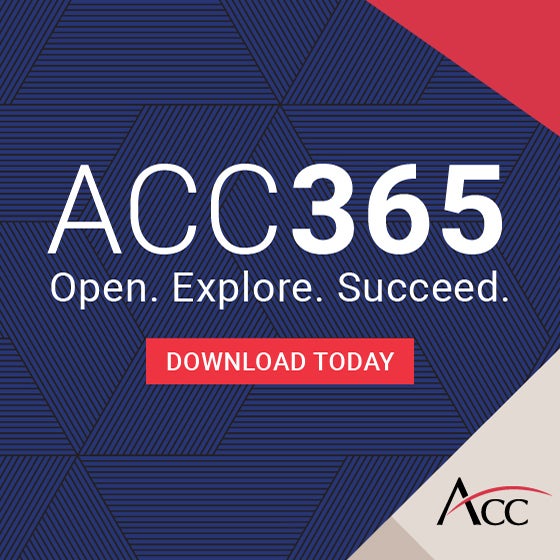In the third month of our new 'Member in the Spotlight' piece, we hear from Andrew Lee, Senior Legal Counsel – Nissan Australia. Each month we will be putting an ACC Australia member in the spotlight and asking them to share their experiences as an in-house lawyer.

1. Tell us about your current role.
I’m a Senior Legal Counsel at Nissan Australia, where I have worked for nearly 5 years. The role involves advising across all Nissan businesses, including the Nissan and Infiniti motor companies, our financial services arm and our manufacturing facility (a metal casting plant). We also collaborate with our legal colleagues in the A&O region and Japan on various projects and matters.
The legal team at Nissan is small – just three of us – so while we have our own subject matter expertise, we are generalist lawyers and advise across all business and legal areas.
At a personal level, I am passionate about the automotive industry, and also Japan, so working at Nissan is very fulfilling for me.
2. What do you believe is the most important skill an in-house lawyer needs?
I believe a deep understanding of the business’ goals and pressure points are critical, and the skills to allow this include being a keen listener as well as friendly and approachable.
There may be an expectation that lawyers talk a lot, but I’ve found that being able to listen intently and truly understand a business’ commercial needs is even more important.
Some people may also view lawyers as an intimidating bunch (perhaps from negative personal experience or TV dramas), so the team at Nissan work hard to break down this stereotype and show what a friendly and approachable lot we are. This helps break down barriers, and allows us to be viewed as business partners helping to achieve the company’s goals, as opposed to the police or as blockers.
3. What led you to pursue an in-house legal role?
When I was in private practice, I specialised in quite a narrow area of law, and I was keen to expand my world view and experience more and broader areas of the law. My in-house legal roles have certainly achieved this in terms of the variety (and volume!) of work that passes across my desk.
I was also keen to work with people other than lawyers (law firm life can be a bit of a bubble!), and getting a closer insight into how a company functions through them. These days, I work with and learn from experts in a huge range of fields, from sponsorship and digital marketing, to warehousing and logistics, product design, sales and customer experience as well as other professionals like accountants, engineers and HR. Compared with being surrounded by an office of lawyers, it is a much more diverse bunch of people!
The prospect of a more rounded work life balance was also appealing, as my first child had just arrived and I was seeking more family friendly and predictable hours. My in-house experience has delivered on this front, and has allowed me to be involved in the daily family rituals that I have come to truly value - dropping off the kids, being home for dinner and attending those all-important school concerts.
4. What advice would you offer to in-house counsel in building relationships with their organisations?
It seems overly simple, but seeking out a thorough understanding of the business’ goals, and working with the business to achieve those goals, is a great foundation for building solid relationships. Of course, there may be potential challenges in navigating compliance, ethical and business risks to achieve those goals, and these can be seen as opportunities to demonstrate how in-house counsel manage risk appropriately and help find innovation solutions.
5. What is the one thing a law degree doesn’t teach you about being an in-house lawyer?
There are many things a law degree doesn’t teach about being a lawyer! In terms of in-house practice, the business wants short and sharp answers, and practical courses of action where risks needs to be mitigated. A useful starting point to achieve this is concise and plain English drafting and understanding the basic business contexts in which you’re advising.
6. What are the biggest changes you’ve witnessed across the legal sector since you joined the profession?
I think that companies are becoming smarter and more targeted with their external law firm spend, for example, fixed fee quotes and performing competitive tenders for bigger projects. I have noticed companies becoming increasingly self-sufficient and engaging law firms more strategically and for expertise needs, as opposed to meet internal capacity constraints. There are also many more options available to in-house departments needing extra temporary headcount, in addition to the traditional law firm secondee.
In-house departments are at various stages of utilising technology to capture data, generate efficiencies, and provide a more responsive and measurable service to their businesses. I think this is a trend that will accelerate in the coming years as the technology becomes more widespread, proven and cost effective.
7. Finish this sentence…. If I wasn’t a lawyer I’d be….
…still in the automotive industry, either at a car manufacturer working on future product, or maybe as a motoring journalist. Being flown around the world to attend motor shows and new car launches seems like a pretty good gig!
I like being a part of the ACC Australia community because ……. its filled with supportive, diverse and friendly people! I’ve thoroughly enjoyed meeting and getting to know the ACC community including at the national conference and trivia night and through the mentoring program.

